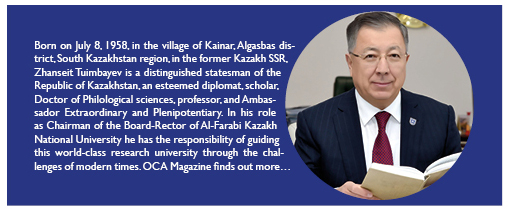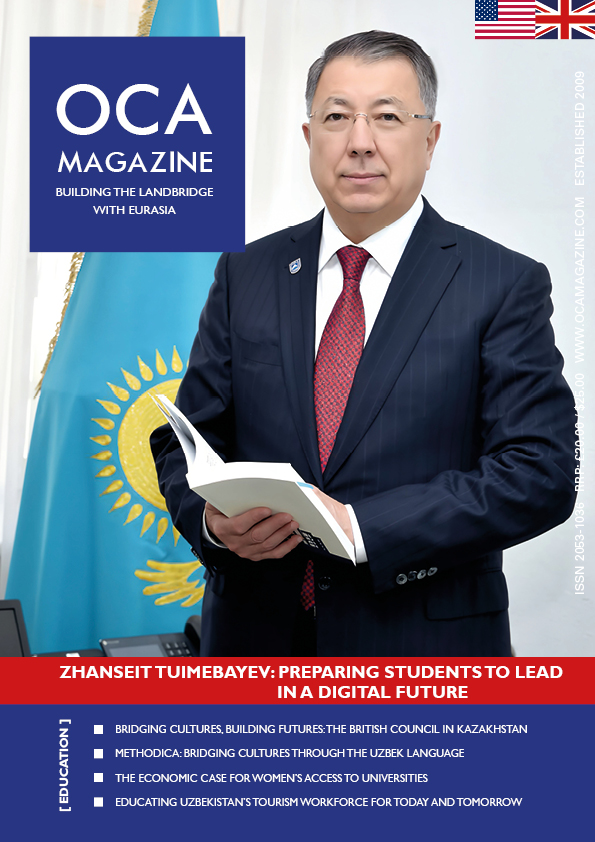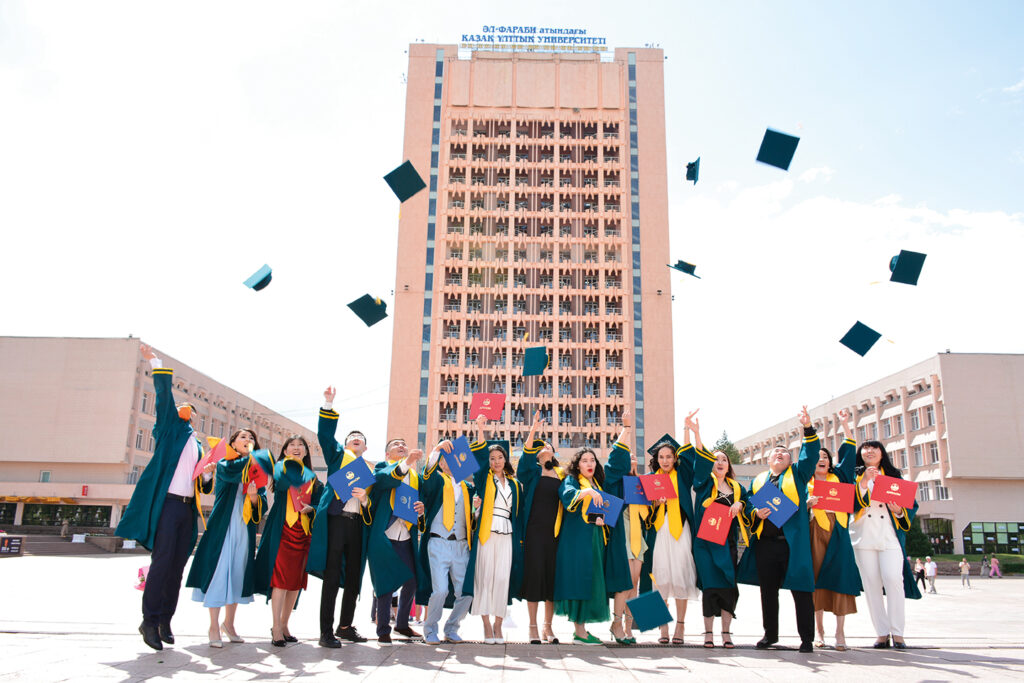PREPARING STUDENTS TO LEAD IN A DIGITAL FUTURE

Interview: Zhanseit Tuimebayev, Chairman of the Board-Rector of Al-Farabi Kazakh National University
OCA: What are the main challenges and prospects of the educational services market that are most significant in your segment? What practices do you use to overcome these challenges?
Zhanseit Tuimbayev: Al-Farabi Kazakh National University (KazNU), Kazakhstan’s leading multidisciplinary institution, combines research and education to train specialists. With over 27,500 students, including 4,000 international learners from more than 50 countries, the university enhances competitiveness through increased enrolment. To address AI, digitalization, and emerging industries, KazNU updates its 500+ academic programs to align with national and global priorities. Advancing towards the era of digital universities, KazNU is busy automating processes and expanding digital resources, offering 127 online courses through the Open KazNU platform and collaborating with Coursera to provide a national digital education initiative.
Generative AI enhances academic programs, improving teaching, learning, and preparing skilled professionals, boosting national and global competitiveness. KazNU offers 60 dual-degree programs with top institutions like Wismar University, University of Lisbon, Sapienza University of Rome, University of Lorraine, Northwestern Polytechnical University, and Lomonosov Moscow State University.
Following the directive of the President of Kazakhstan to establish branches of top foreign universities by 2025, branches of Russia’s National Research Nuclear University “MEPhI” and China’s Northwestern Polytechnical University are now present at our university. Expanding internationally, branches have been opened in Istanbul and Bishkek, with a new branch at Omsk State University planned for September 2025.
KazNU’s academic programs benefit from advanced research initiatives like the Centre for Engineering Competencies in Industrial Robotics. The 5,000 square metre Farabi HUB supports innovation in AI, start-ups, and creative industries with state-of-the-art labs and collaborative spaces. In collaboration with China, KazNU hosts Central Asia’s most powerful supercomputer (1.94 Petaflops), aiding research in AI, biotechnology, energy, and other key sectors, placing Kazakhstan at the forefront of scientific advancement.
KazNU strengthens ties between science and industry through its “Chemical Coating Innovations” centre, producing galvanic coatings and integrating advanced technologies. The Farabi Chem Science cluster, with nine labs, fosters innovation in fire-resistant materials for energy storage and medical solutions. The Kazakh-Chinese Remote Sensing Technologies lab conducts research to enhance risk forecasting. The Faculty of Geography and Nature Management operates the “Sustainable Development and Rational Nature Management” centre, featuring 10 specialized labs tackling climate, digital mapping, hydrology, and geo-ecology to address ecological challenges.

OCA: What are the main trends that, in your opinion, will change the education system in the next five to ten years? What are you doing now to be prepared for the future?
ZT: The education system is transforming due to technology, global challenges, and societal shifts: AI and big data is enabling personalized learning paths tailored to each student’s strengths and future career potential. I expect that the future of education will blend digital and physical learning, with VR providing immersive training in fields such as medicine and science. As the job market evolves, micro-credentials and stackable degrees will likely streamline IT education.
While AI won’t replace workers, those who master it will lead. Ultimately, automation may increase the need for irreplaceable human skills: creativity, empathy, and collaboration. At KazNU, therefore, we look to help create the future. Through digital innovation, global partnerships, and sustainable growth – including our KazNU-grad 2.0 expansion – we shape a world-class hub where students address tomorrow’s challenges today.
OCA: What strengths of the university, its team and you as a leader do you consider the most significant in terms of achieving success and maintaining a high level of educational services?
ZT: KazNU excels by combining academic heritage, strategic leadership, and collaborative innovation. As Kazakhstan’s oldest university, we have a legacy of trust among students, partners, and the global community. Our reputation features distinguished alumni like Tattym Shaiken, a senior research fellow at the University of Houston, known for pioneering cancer research; Arkhat Abzhanov, an associate professor at Harvard University and renowned molecular biology innovator; and Vitaly Khutoryansky, a professor at the University of Reading, who has made breakthroughs in polymers, nanomaterials, and pharmaceuticals.
Our faculty comprises seasoned experts and young innovators, with 80% holding advanced degrees and 30% trained abroad. Leadership requires a long-term vision and adaptability. The rector should promote dialogue among students, faculty, and partners from academia, business, and government to ensure transparent decision-making and strategic growth. KazNU exemplifies a unique blend of heritage, adaptability, and visionary leadership, shaping the future of global education innovation.

OCA: What benefits do you offer to the many partners who have joined with your efforts?
ZT: We build sustainable relationships with top global universities and research centres, currently having over 700 partnerships in Europe, North America, Asia, and the Pacific. Our scientists engage in global research via Erasmus+, Fulbright, and DAAD schemes, positioning the university as an innovation hub. Key collaborations include: the “Centre for Legal Research of China and Central Asia,” Xi’an Jiaotong University, the joint “Kazakhstan Research Centre” with Beijing Language and Culture University, and the “Remote Sensing Technologies and Their Applications” lab with the Xinjiang Institute of Ecology and Geography.
In collaboration with a French lab, we launched the ZooStan Archeozoological Centre to study Central Asia. KazNU prepares students for global success through exchanges, internships, and practical training, with over 2,500 participants in academic mobility programs (250 undergraduates, 1,500 master’s, 750 PhDs) since 2022.
KazNU hosts over 700 exchange students from abroad, providing full access to labs and research facilities. Our partnership with the American Council for International Education also brings 120 U.S. students for Kazakh/Russian language training (Flagship Program) and an additional 300 under the RLASP program for cultural and historical studies.
OCA: What advice can you give to students to help them choose the right university?
ZT: Choosing a university is a life-changing decision that shapes your career and worldview. First, define your professional goals. Aspiring IT professionals should seek universities with strong programs and industry connections, such as partnerships with leading companies. Global rankings like QS, where KazNU ranks 166th, can provide guidance. Also consider dual-degree options, academic mobility, and campus infrastructure—digital resources, libraries, and student life. The best university isn’t always the highest-ranked but should be where you can unlock your potential.
